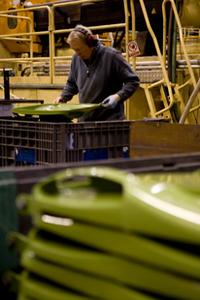Many may feel as though their green agenda may have to take a backseat in favour of other protecting other priorities. However, this would be a short sighted view and would be to the detriment of the hard work that has already gone in to raise awareness of the issue.
In fact, the councils' responsibilities to tackle sustainability have become even more important – especially when they have to be delivered against a backdrop of spending cuts. Rather than seeing a drop in the level of commitment to tackle sustainability, local authorities to keep up the momentum.
The key to success in the green journey going forward will be to form strong sustainability processes and plans and to build strategic partnerships both within councils and private sector businesses – especially suppliers.
Recycling of plastics
Take the recycling of plastics as an example. It has been an issue at the forefront of the waste management strategies facing local councils over the last few decades. In fact, the Department for Environment, Food and Rural Affairs recently announced that packaging recycling targets for plastics would increase to 32% for 2011 and 2012.
Plastic, mostly from packaging, accounts for a vast majority of today's household waste and the industry has often complained that it struggles to meet its recycling targets.
With landfill space rapidly running out and recycling targets to meet it is little wonder that local authorities have been forcing the importance of the contribution households can make on helping to reduce these figures.
Increased marketing campaigns, the introduction of kitchen and kerbside caddies are just a variety of ways that waste management officers have tried to educate homeowners, to separate and consequently recycle their waste.
With the budgets of every single council now coming under greater scrutiny, following the government's spending review, the pressure on waste management teams to deliver on time and on budget has vastly increased.
Insisting on recycled content
Despite a campaign a few years ago, to get local authorities to think about their own buying and sustainability habits, there are many who are still missing out on ways to improve resource efficiency at little or no extra cost across their buying and procurement activities.
In fact, by not buying more eco-friendly, they are also in danger of overlooking potential cost savings. But more importantly, they could be missing a very simple marketing and PR trick with the hundreds of thousands of households they are tasked to serve.
For example, local authorities could be hitting their sustainability targets by insisting on working with suppliers who provide recycled materials in their products. This policy needs to become embedded in every procurement decision.
Councils across the country need to make sure that all materials in products used to deliver their waste management strategies include a recycled content target and consequently lead the drive to sustainability from within.
Culture and procurement change is needed
However, to do this it requires a culture change and a procurement strategy with sustainability at its core. Many council officers may be under the impression that being sustainable costs money. But being sustainable and improving resource efficiency through this policy comes at no extra costs and can even lead councils to be more accountable.
In addition, by specifying and setting a target for recycled content in goods, works and services supplied to them, councils can independently contribute to the green agenda, while setting a clear benchmark for homeowners to follow.
In the last quarter of 2009, MGB Plastics delivered 200,000 new wheelie bins to Hull city council. It may seem a relatively simple contract to fulfil but this contract came with a difference. Not only did MGB Plastics deliver the contract on time, but also collected all the decommissioned bins from every household.
But the best part of the contract was that MGB took these defunct plastic bins back to its manufacturing base, recycled them and used the same content to make brand new bins.
This meant that not only had MGB and the local council used recycled material, but more importantly collectively they had helped drive the sustainability agenda from within by prevented thousands of bins being sent to the landfill and consequently not adding to the millions of tonnes of plastics which get buried at landfill sites every year. Hull city council consequently recorded a 70% recycling rate during a period of the roll-out – a huge improvement on its 30-40% average previously.
It is strategies and targets like this which may seem insignificant on the surface, but have an everlasting impact on the road to sustainability. Buying recycled for every goods and services may not work for local authority in every case but making a start is the most important thing.
Local authorities have a major part to play in driving up recycling rates as and many can really lead by example if they take this issue to heart and make sure that recycled content, whether it is plastic or cardboard, is at the forefront of their procurement decisions.














Subscribe for free